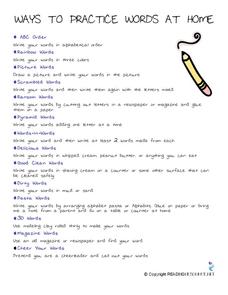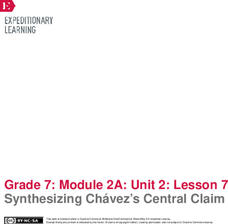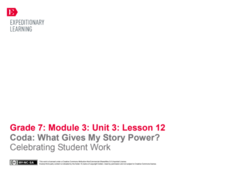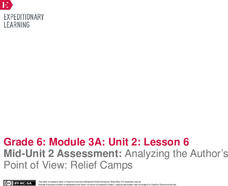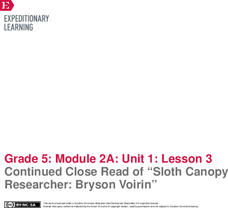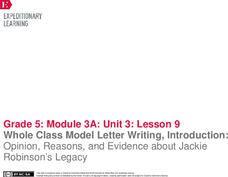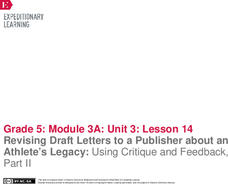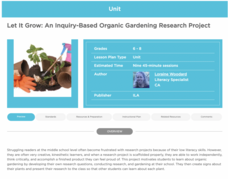Reading Resource
Ways to Practice Words at Home
Looking for more ways to practice writing words? A list of 27 strategies will engage learners of any level. Kids can choose between writing their words in peanut butter, criss-crossing them with words that share common letters, and...
American English
Welcome to the Color Vowel Chart
Focus English language learners' attention on word stress and phrase stress with a pronunciation chart that breaks the sounds into moving and non-moving vowel sounds. The chart tool uses colors and key words to indicate where to put the...
New Brunswick Department of Education
Personal Development And Career Planning Curriculum Grade 9/10
What is the difference between a proactive person and a reactive person? Scholars explore the topic, and many others, with helpful lessons, discussions, role play activities, and games. Each activity supports one of the key principles...
Meadows Center for Preventing Educational Risk, University of Texas at Austin
Lesson 13 - Multisyllabic Word Reading
One- and two-syllable words may flow from the tongue with ease, but longer words, such as department and volcano, feel like tongue twisters. Scaffolded instruction explains how to break words into their individual syllables, and then...
Meadows Center for Preventing Educational Risk, University of Texas at Austin
Lesson 2 - Consonant-Vowel-Consonant Words
Closed syllable words contain short vowel sounds. A phonics lessons introduces readers to consonant-vowel-consonant words. Guided instruction introduces the words with a series of dictation activities, and then learners practice reading...
Meadows Center for Preventing Educational Risk, University of Texas at Austin
Lesson 8 - Open Syllables
Just like scholars plug something in to close a circuit, they must plug a consonant onto a word to make closed syllables. Help learners distinguish between open and closed syllables with a series of activities that emphasize open...
ProCon
Minimum Wage
The first ever minimum wage in America was set at 25 cents per hour in 1938 and has been steadily, if slowly, increasing ever since. Using the provided website, pupils decide if the United States should further increase the federal...
EngageNY
Analyzing Character and Theme: Tracking Control in A Midsummer Night’s Dream
Scholars examine how characters try to control one another in Shakespeare's A Midsummer Night's Dream. They engage in a read-aloud and class discussion to iron out ideas. They also work in small groups to complete a note-catcher...
EngageNY
Analyzing the Resolution of the Play: World Café Discussion
It's time to get active! Scholars participate in a World Café protocol to promote discussion and leadership. They leave their seats and move from group to group to discuss critical questions related to their read-aloud of Shakespeare's A...
EngageNY
Final Performance Task: Sharing Visual Representations of Position Papers
It's time to put down those pencils and celebrate! Scholars share the visual representations of their position papers with the class. They participate in a gallery walk to view each other's work, writing a piece of praise for their...
EngageNY
Synthesizing Chávez’s Central Claim
Class members play an interactive game, matching strips of paper containing rhetorical devices with examples from César Chávez use rhetoric in his 1984 speech, "Address to the Commonwealth Club of California." Next, partners discuss...
EngageNY
Coda: What Gives My Story Power? Celebrating Student Work
It's time for a celebration! Scholars go on a gallery walk around the classroom to view their peers' completed illustrated children's stories. Using sticky notes, pupils provide feedback about the powerful elements they find in their...
EngageNY
Identifying Main Ideas and Supporting Details: What’s Going On in the Teenage Brain?
What's going on in the teen brain? Pupils consider the question as they continue reading an informational article about the topic. While reading, they use a Thinking Log worksheet and an anchor chart to track their understanding of...
EngageNY
Forming a Research-Based Claim: Analyzing Risks and Benefits for Stakeholder
Welcome to the World Café, where lively debate is on the menu! Scholars participate in the World Café protocol, moving between discussion groups to decide if the American Academy of Pediatrics should increase its adolescent screen time...
Teaching Tolerance
Social Media for Social Action
Engage in activism, not slacktivism! Scholars discuss social media and the Internet as tools for social change. Next, they engage in a close reading strategy called Thinking Notes as they read an article about social media activism.
Teaching Tolerance
Constructively Engaging in Digital Communities
Say no to hate speech! Pupils discover the importance of practicing empathy and inclusivity in digital communities and discuss strategies for responding to online hate speech. Then, small groups develop and present class guidelines for...
EngageNY
Mid-Unit 2 Assessment: Analyzing the Author’s Point of View: Relief Camps
We're halfway there ... what a relief! Scholars read an excerpt from a primary source about the relief camps associated with the1906 San Francisco earthquake. Next, they complete a mid-unit assessment, answering short-answer and...
NPR
Teaching Podcasting: Planning the Story
Without structure, things fall apart. Scholars discuss the importance of structuring a podcast to tell a story that makes sense. They walk around the classroom, stopping at stations to answer questions on posters about planning their...
EngageNY
Performance Task: Hosted Gallery Walk of Scientific Posters
The guests have arrived. Scholars participate in a hosted gallery walk, using their scientific posters to share their research about DDT with their classmates. Then, using sticky notes, individuals leave positive feedback on their peers'...
EngageNY
End of Unit Assessment: Individual Sections of Readers Theater Script
Let's play! Pupils create titles for their readers theater scripts and act them out in a fun game of charades. Next, as part of their end of unit assessment, they write final copies of their individual scripts.
EngageNY
Continued Close Read of “Sloth Canopy Researcher: Bryson Voirin”
Let's explore the rainforest by studying its inhabitants. Pupils continue reading an interview with a sloth scientist and answer text-dependent questions. Next, they engage in a class discussion to share the new facts they learned about...
EngageNY
Whole Class Model Letter Writing, Introduction: Opinion, Reasons, and Evidence about Jackie Robinson’s Legacy
Sharing is caring! Using the collaborative lesson, scholars engage in a shared writing process with the teacher. Working together, they compose opinion letters about Jackie Robinson's legacy.
EngageNY
Revising Draft Letters to a Publisher about an Athlete’s Legacy: Using Critique and Feedback, Part II
Let's get opinionated. Scholars participate in a peer critique and revision process using a fun activity called a Four Corners strategy. After incorporating classmates' feedback, individuals share their final drafts of their opinion...
ReadWriteThink
Let It Grow: An Inquiry-Based Organic Gardening Research Project
How does your garden grow? An inquiry-based, organic gardening unit asks young scientists to research a vegetable or flower, create an environment for it, and then plant and tend to the seedling. Gardeners develop their own research...
Other popular searches
- Kinesthetic Learner
- Kinesthetic Math
- Kinesthetic Learner Math
- Literacy Kinesthetic Learner
- Asian History Kinesthetic
- Kinesthetic Learner English
- Kinesthetic Lesson Plans
- Kinesthetic Punctuation
- Kinesthetic Intelligence
- Kinesthetic Math Games
- Kinesthetic Awareness
- Kinesthetic Learner Reading


